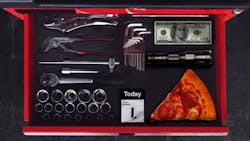To tackle the technician shortage, the industry must not only boost recruitment but also ensure that it can retain the technicians it already has. While this seems easy enough on paper, WrenchWay, an organization that matches techs with shops, reported that 79% of technicians have considered leaving the industry in 2022.
“One of the number one issues we see with a technician is that oftentimes, they feel like a number,” said Jay Goninen, co-founder and president of WrenchWay and a former technician. “They don’t feel like their thoughts matter in a shop, and that can be as big of a driver to them leaving as anything.”
So how do you make technicians feel like they’re not just another cog in the maintenance engine, endlessly toiling to improve fleet uptime?
Read more: Sweetening the deal for shop technicians
Zippia reported that strong employee recognition programs reduce turnover rates by 31% and that employees who are recognized are almost six times more likely to stay at their jobs than those who aren’t. Now, this doesn’t mean shop managers need to offer each technician a daily raise or a brand-new toolbox each week, but there are other work perks you can offer to improve your techs’ lives and keep them on the floor instead of out the door.
Tool allowances
In the technician’s trade, not only are the trucks expensive, complex pieces of machinery, but the tools can be costly as well. WrenchWay reported that 57% of technicians estimate that they spend over $60,000 on tools throughout their career, and 33% think the biggest challenge for new technicians is the tool investment. This makes tool allowances one of the most directly beneficial work perks—if handled correctly.
“I’ve worked at a place before where they’re like, ‘Yeah, we give you $100 toward your tools a year,’” said Celine Young, a J.B. Hunt shop supervisor in Windsor Locks, Connecticut. “That’s great, but I’d rather you just keep the $100 at that point.”
Considering the cost of some of the tools a technician needs, offering the right amount for an allowance is critical to making sure this benefit is a perk, not an insult. But if done well, tool allowances can enhance both recruitment and loyalty, said Tim Rothbauer, VP of business development at Imperial Supplies, a provider of heavy-duty truck parts and equipment.
To set up a strong tool allowance program, Imperial Supplies usually works with a fleet’s maintenance, finance, HR, and IT departments to meet their retention goals. Then they can offer a specific selection of tools that the fleet can show their techs, with some of the most popular being impact wrenches, ratchet sets, torque wrenches, and cordless tools and batteries.
“Customers don’t want mechanics to be able to buy a refrigerator; that doesn’t help them do their job,” Rothbauer explained. “So, we work with them to define what is going to be the product list that they have access to.”
This list can be as short as 100 items or as long as 1,000. The company then pays for the tools the technician selects from the list, which tends to be the most successful model at Imperial Supplies.
“There are other programs we’re aware of where mechanics might be able to lease the tooling from the company under a wage garnishment-type program,” Rothbauer acknowledged. “From what we’ve heard, those typically are not as well received because the mechanic feels like they’re on the hook to the company, whereas in this case, the company is buying it for the mechanic and truly showing their appreciation. Likewise, for us, we’re discounting the tooling to make sure that the company and the mechanic are getting a true value for the program.”
Scheduling flexibility
One of the most cost-effective perks to provide to techs is a flexible schedule. But while shop managers might balk at the idea of being short-staffed during peak hours, it’s not that technicians don’t want to work, they just want to have a measure of control over when they work.
“If they’re being paid fairly and they get flexible schedules, or at least an adaptable schedule that can work with their personal life, I do think that goes a really long way,” WrenchWay’s Goninen said. “And if nothing else, it shows that you’re listening to them and that you actually care about them as a person.”
This approach allows technicians to attend their kids’ soccer games and visit ailing family members as long as they can make up the hours later. And statistics show that when given the option, they will make up the hours. WrenchWay reported that 22% of technicians don’t mind working weekends, with an additional 44% willing to work weekends for the right incentives.
As an example, J.B. Hunt’s Young works a four-day week from Sunday through Wednesday. “They try really hard to have a good work-life balance,” she said. “It encourages people to take their time off to do what they need to do to be there for their families. It definitely helps with retention.”
Physical or digital gifts
One of the easiest ways shops can show technicians that their work matters is through the occasional token of appreciation. These don’t have to be expensive and only take a bit of personal investment on the manager’s part.
“Knowing that you are appreciated through small, mindful gifts is a great touch to show that you, as a manager, listen and know your employees,” said Cindy Barlow, director of industry outreach at the diesel and collision trade school WyoTech. “Will things like this help in technician retention? Without question.”
As an example, Ryder System, Inc. celebrated this year’s Technician Appreciation Week with a gift and a personal thank you from each location manager to their technicians, said Lesley Kerr, VP of human resources, Ryder. This year, the shop managers gave their technicians a Ryder-branded Yeti coffee mug.
“Last year, we gave a really high-quality flashlight to the technicians,” said Bryce Kinsley, VP of maintenance at Ryder. “These were well-received two years in a row.”
Technician tokens of appreciation don’t need to be physical gifts or even shop- or fleet-branded. Goninen’s father, who owns a Wisconsin-based independent shop, once gifted his best technician a subscription to Scanner Danner, a library of diagnostic training video resources and case studies on engine performance, computer controls, and electrical systems.
“We went out and got him the premium subscription because that was something that he really liked,” Goninen recalled. “And he was tickled pink.”
That subscription cost $11 per month.
“There are ways to hold down the cost,” Barlow mentioned. “Remember, this is about building relationships and that means everyone has a part in it.”
Free food
Of course, we’d be remiss to talk about perks without bringing up one of the best of all: free food. At her shop, J.B. Hunt’s Celine Young said techs can earn a free lunch each month for meeting safety goals.
“For every milestone of one, two, or three years of being safe with no reported accidents or incidents, we get a big lunch,” Young said. At their most recent lunch, “we had steak and baked potatoes, and we were given two hours to relax, hang out, and enjoy each other’s company.”
Ryder also offered their technicians free food for Technician Appreciation Week, which was largely driven by the local shop managers.
Read more: Best tech appreciation tip? Feed them
“Some of them brought in games during the day to entertain their techs. There were food trucks, and some of the managers would barbecue,” Ryder’s Kinsley noted. “It was very unique from location to location, and being able to hear some of the stories in our world of what those locations did for their technicians was pretty impressive.”
Free food can also be used to celebrate a tech for their years of service, whether it’s five years or 45. For those celebrations, the important part is tailoring the reward to the technician and what they would appreciate. This emphasizes the unique community of each shop location and the individual role each tech plays in that community, Kinsley and Kerr explained.
Perks shouldn’t replace strong salaries and benefits
All of these strategies can help increase technician retention and recruitment, but it’s important to note that they’re not replacements for a salary that supports a technician’s family, strong benefits packages, and trustworthy leadership.
“I mean, it’s nice to have four-day workweeks, and it’s nice to have the lunches and feel appreciated,” Young noted. “But if you don’t have everybody on the same page for what is expected of the management team, feeling appreciated doesn’t amount to much.”
“Salary is still number one,” Goninen added. “With that being said, I think you have to appeal over and above salary.”
These perks can add miles to a technician’s job satisfaction, many of which come down to recognizing the individuality of a technician as more than a simple worker drone, but a skilled employee whose input is valued as much as their work. This gives them the ability to work in the way that best suits them, and thus the shop.
“If you don’t feel like you’ve got any control over what’s happening to your life, you don’t feel as confident and you don’t feel as happy,” Goninen concluded. “Even if it’s something that’s simple, as long as you’re getting some ability to control schedule or pay, the more flexibility the better.”
About the Author

Alex Keenan
Alex Keenan is an Associate Editor for Fleet Maintenance magazine. She has written on a variety of topics for the past several years and recently joined the transportation industry, reviewing content covering technician challenges and breaking industry news. She holds a bachelor's degree in English from Colorado State University in Fort Collins, Colorado.
